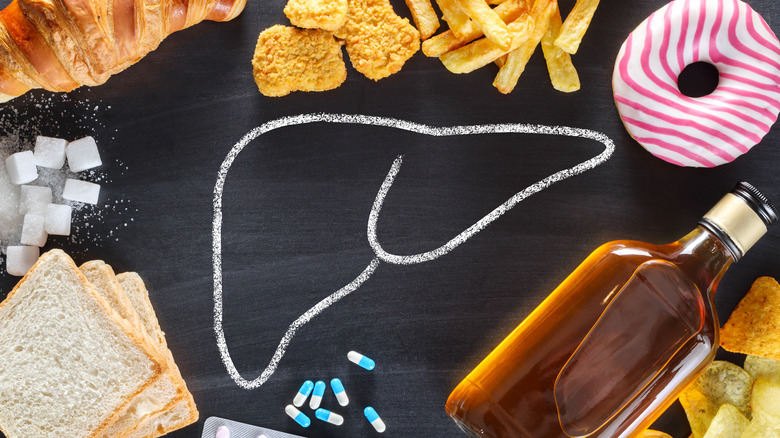Why Avoiding Fast Food Can Help Save Your Liver
In our modern world, it can be challenging to avoid the convenience of fast food restaurants. The food is quick and delicious, but it can come at a cost. A 2023 study published in the Clinical Gastroenterology and Hepatology showed that it could also seriously harm the liver, which can ultimately lead to liver complications and even liver failure (via WebMD).
Fast food has notably changed over the past 30 years, according to a 2019 study published in the Journal of the Academy of Nutrition and Dietetics. This included portion sizes, calorie count, and sodium levels in fast food entrees from 1986 to 2016. The variety of food options throughout several restaurants also increased by 226%.
Consuming fast food, like hamburgers, fries, and pizza, has adverse health effects (per Medical News Today). Because these items are typically high in salt, sugar, processed ingredients, preservatives, and saturated or trans fats, they can increase inflammation, blood sugar, and blood pressure and lead to binge eating. In the long run, consuming fast food can increase your risk for diabetes, obesity, and cardiovascular conditions. It's even been associated with depression and anxiety. However, here's how it'll affect your liver.
The dangers of too much fast food
A new study published in Clinical Gastroenterology and Hepatology found that in addition to having negative impacts on things like your heart and blood sugar, consuming fast food can also increase your risk of nonalcoholic fatty liver disease (via WebMD). Experts looked at the data of nearly 4,000 adults from the 2017-2018 National Health and Nutrition Examination Survey (NHANES) survey, analyzing their diet and fatty liver measurements. Turns out, when participants consumed at least 20% of their total daily calories from fast food, they were more likely to develop fatty liver disease, which can lead to cirrhosis, liver cancer, and liver failure. Those who already had diabetes or obesity had even higher risks.
In addition, researchers expressed concern, as 30% of the respondents were getting 20% or more of their daily calorie needs from fast food sources. Even just one fast food meal a day could reach this amount. "This is especially important as more people have turned to fast foods during the pandemic and as the price of food as risen dramatically over the past year due to food inflation," says Dr. Ani Kardashian, the lead author of the study. Therefore, she suggests more policies need to be changed so that more nutrient-dense, affordable, and accessible food options are made available to all people across the country. Dr. Kardashian hopes that the results of the study will encourage Americans to opt for more nutritious food choices.


